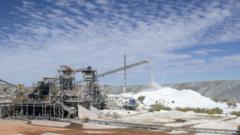Amid rising trade tensions with China, Australia's Prime Minister Anthony Albanese has put forth a bold vision to bolster the nation's critical minerals sector, particularly in light of China's recent export limitations on rare earth elements, essential for advanced technologies.
Australia Prepares to Challenge China's Rare Earth Dominance Amid Export Restrictions

Australia Prepares to Challenge China's Rare Earth Dominance Amid Export Restrictions
Australia is gearing up to invest significantly in critical minerals as China's export restrictions escalate trade tensions, with a strategic reserve plan announced by Prime Minister Albanese.
Australia’s Prime Minister, Anthony Albanese, has announced a commitment to invest A$1.2 billion (£580 million) in a strategic reserve for critical minerals, aiming to secure supply amid intensifying global trade tensions. This announcement follows China's decision to impose export restrictions on seven rare earth elements that are vital for manufacturing electric vehicles, advanced weapon systems, and various cutting-edge technologies.
Albanese emphasized that Australia will focus on securing minerals crucial for national and partner security, potentially challenging China's current dominance in the global rare earth supply chain. With the increasing reliance on rare earths, which include elements like samarium and terbium, Australia seeks to leverage its own substantial reserves of critical minerals, including lithium and cobalt. Notably, although both Australia and China possess significant rare earth reserves, approximately 90% of rare earth refinement occurs within China, giving them considerable control over the market.
The restrictions imposed by Beijing have been interpreted as a retaliatory measure against extensive tariffs placed on Chinese imports by the former US administration. Analysts contend that while past US administrations have overlooked the strategic importance of rare earths, the current climate has raised alarms regarding ongoing dependencies. Between 2019 and 2022, around 75% of US rare earth imports originated from China, heightening concerns over supply chains linked to defense technologies.
Elon Musk, CEO of Tesla, recently indicated that limitations on rare earth exports are adversely impacting the company’s ability to develop humanoid robots. Such developments underscore the tangible implications of China's grip on strategic materials.
Albanese's initiative opens a pathway for both domestic industries and international allies to access vital minerals. Yet, industry analysts like Philip Kirchlechner stress that while the move is a necessary step, it may not fully address the predominant issue—the refinement of rare earths, which will still be largely dependent on China for the foreseeable future.
Australia has initiated investments to enhance its rare earth refining capabilities through projects like Arafura Rare Earths’ mine and refinery enterprise and the establishment of Australia's inaugural processing plant by Lynas Rare Earths. However, projections indicate the nation will continue to rely on China for refining until at least 2026.
China's recent actions have sparked discourse in Australian media, with critiques aimed at Washington's trade strategies and encouragements for closer ties with Beijing—an appeal dismissed by Albanese. Although Australia aims to bolster its resource sector, experts underline that the complete severance of dependence on China remains unlikely, particularly in refining capacities.
Alfred García-Herrero from Natixis pointed out that while Australia strives to serve as a pivotal player in supporting Western initiatives, vulnerabilities remain that China could exploit, especially concerning refinement operations. As geopolitical tensions rise and market dynamics shift, Australia's path forward will prove critical in reshaping the global rare earth landscape.




















